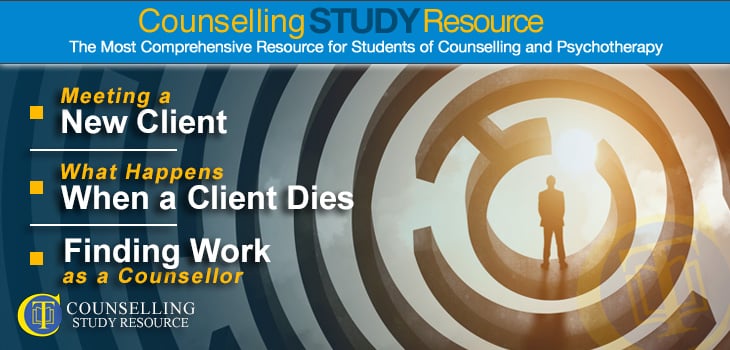112 – Finding Work as a Counsellor
Meeting a New Client – What Happens When a Client Dies
In episode 112 of the Counselling Tutor Podcast, Ken Kelly and Rory Lees-Oakes explore the etiquette of meeting a new client. In ‘Practice Matters’, Rory talks about possible procedures when a client dies. Finally, the presenters discuss finding work as a counsellor.
Meeting a New Client (starts at 1.55 mins)
When you meet a new client for the first time, what is the etiquette?
Ken and Rory offer a number of top tips on this:
- Remember that the client may well be feeling nervous (more so than you!): be warm and smile (but don’t be too jolly, as that might seem inappropriate).
- Ask them how they would like to be addressed: the name on their referral form may not be their preferred one.
- Let the client take the lead on shaking hands etc. – if they wish to do so, then do respond, but it’s better not to initiate this yourself. This encourages client autonomy.
- Offer them a drink if this fits with your agency’s policy.
- Mirror their tone of voice and way of being – e.g. if they speak softly, then match this rather than speaking loud.
- If the client says they’re nervous, explore what it is they’re nervous about; this again helps give them autonomy.
- Try to avoid ‘leakage’ (i.e. the client disclosing sensitive material before they are in the counselling room and have agreed to the contract).
Do you have any more tips that you’d like to pass on to other students of counselling and psychotherapy? If so, please do share these in our Facebook group.
What Happens When a Client Dies (starts at 14.56 mins)
Rory talks about the difficult issue of hearing that one of your clients has died, focusing on professional competence in this challenging situation, including:
- what you may be called to do
- what you should already have in place
- how to support yourself.
In particular, he describes when the coroner may become involved, and how you – as the person’s counsellor – may be expected to participate in the resulting process.
Finding Work as a Counsellor (starts at 22.13 mins)
The availability of work for qualified counsellors is an especially hot topic in the Counselling Tutor Facebook group.
Students invest a lot of money in their training, and it is natural to wonder whether it will be possible to earn this back through paid work.
Rory and Ken’s thoughts on finding work as a counsellor are as follows:
- Don’t talk yourself out of success by being negative about your chances of getting paid counselling work: Rory reports that many of his former students have developed successful careers in the counselling field.
- There is paid work available in counselling. This may be easier to find in large cities than more rural places, but not necessarily so. It’s really important that you have your level 2 maths and English (i.e. GCSE or equivalent). If you’ve not, ask at your college whether they can help you get these.
- Many agencies look less at academic qualifications than at the person and their work experience. For example, if you have experience of working with trauma, a good understanding of quality and diversity, and a real passion to help clients and belong to that organisation, you may well stand out.
- Do keep and take along to any interviews your CPD log – with over 60 hours of CPD available online, the CSR can really help you build this.
- When offered the opportunity to ask the interviewers any questions yourself, make sure you do so. Keep back a key question for this purpose, perhaps based on information you have found through researching the agency’s website. Again, this can really help you stand out from other candidates.
Don’t forget too that another option in finding work as a counsellor is to employ yourself, by becoming a private-practice counsellor when you feel you have the experience and confidence to do so.
Ken makes the exciting announcement that a new module has just been added to the CSR on running a small counselling business. Don’t miss this valuable resource!


